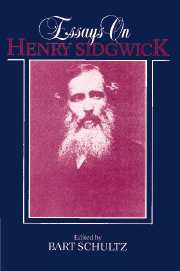Book contents
- Frontmatter
- Contents
- Foreword
- Acknowledgments
- List of contributors
- List of abbreviations
- Introduction: Henry Sidgwick today
- PART I Common-sense morality, deontology, utilitarianism
- 1 Sidgwick and nineteenth-century British ethical thought
- 2 Sidgwick and the Cambridge moralists
- 3 Sidgwick and Whewellian intuitionism: some enigmas
- 4 Common sense at the foundations
- PART II Egoism, dualism, identity
- PART III Hedonism, good, perfection
- PART IV History, politics, pragmatism
- Index
1 - Sidgwick and nineteenth-century British ethical thought
Published online by Cambridge University Press: 05 June 2012
- Frontmatter
- Contents
- Foreword
- Acknowledgments
- List of contributors
- List of abbreviations
- Introduction: Henry Sidgwick today
- PART I Common-sense morality, deontology, utilitarianism
- 1 Sidgwick and nineteenth-century British ethical thought
- 2 Sidgwick and the Cambridge moralists
- 3 Sidgwick and Whewellian intuitionism: some enigmas
- 4 Common sense at the foundations
- PART II Egoism, dualism, identity
- PART III Hedonism, good, perfection
- PART IV History, politics, pragmatism
- Index
Summary
Ethics in nineteenth-century Britain opens with Bentham and ends with Sidgwick and thus both opens and closes with utilitarianism, though utilitarianism of markedly different varieties. The major figure in the middle of the century was John Stuart Mill, and the middle period of the century was dominated both by utilitarianism and by disputes about utilitarianism. Thus, utilitarianism was in many ways the dominant moral philosophy of the century – and there is certainly something typically British about it – but it was by no means the only one. Cambridge rationalism was still strong, especially in the work of William Whewell, who, even though his work has in large measure dropped from sight, was not just another intuitionist, as he came to be regarded by so many, but an acute and knowledgeable thinker who had an ethical theory of some complexity. Idealism, influenced in varying degrees by the philosophies of Kant and Hegel, was especially strong, and especially pronounced in the work of T. H. Green – presently a very underrated philosopher – and F. H. Bradley, who lived well into the twentieth century and whose virtuosity as a dialectician was so strong as to create for him an indelible reputation as a keen philosophical thinker, whose work – as with the paradoxes of Zeno – is to be taken seriously even when it is most incredible.
- Type
- Chapter
- Information
- Essays on Henry Sidgwick , pp. 65 - 92Publisher: Cambridge University PressPrint publication year: 1992
- 1
- Cited by



